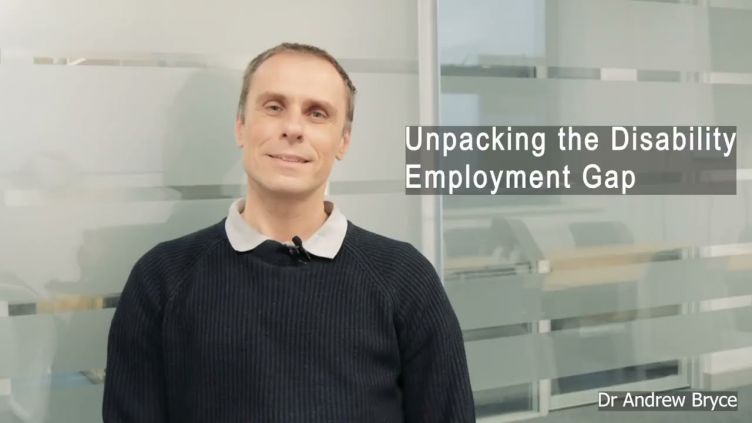This week marks the climax of UK Disability History Month (16 November – 16 December 2022), an annual event to celebrate the lives and achievements of disabled people and raise awareness of the historical and ongoing struggle for disability rights.
It is an appropriate time, therefore, to highlight important research currently being undertaken at the Department of Economics to understand the barriers faced by disabled people when trying to access paid employment.
In the UK, only about half of disabled people of working age are employed, compared to over 80% of non-disabled people. This gap in employment rates, known as the Disability Employment Gap (DEG), has persisted for many years despite the fact that it is illegal for employers to discriminate against disabled people or refuse to provide reasonable adjustments to make workplaces accessible and inclusive.
Our research aims to unpack the DEG and identify the underlying factors explaining why the employment rate of disabled people is so low. Using statistical decomposition methods, we are exploring how much of this gap is due to supply side factors, for example education levels and people’s ability and willingness to work, and how much is due to the demand side, for example the jobs available in different areas of the country. We will also investigate how the DEG has changed over time and how the disruptive events of recent years (e.g. the pandemic and cost of living crisis) have had an impact.
The research team is led by Dr Mark Bryan and also includes Professor Jennifer Roberts, Dr Cristina Sechel and Dr Andrew Bryce. The project is being funded by the Nuffield Foundation and is supported and guided by an Advisory Group made up of leading academics in the field as well as experts from a range of organisations across the voluntary sector and government.
While the overall DEG is important, our research recognises the fact that not all disabled people are the same or face the same barriers to work. Employment rates are particularly low for people with a mental health condition or a more severe impairment, and disabled people who are older or have low levels of education. Moreover, the DEG varies considerably across the UK (and is particularly high in Northern Ireland, for example). By decomposing the DEG at these more disaggregated levels, we aim to provide more tailored policy recommendations than are currently available.
Mark Bryan, the principal investigator (PI) for the project, highlights how our research is designed to have a lasting impact. “We will provide timely evidence on the factors behind the DEG, spatial variation in this gap and how it has changed over time. We want to use this evidence to shape policy aimed at addressing the DEG, and to inform efforts to reduce geographic inequalities in disability employment rates. We will provide guidance on which factors policymakers should target, whether different local policies are needed, and which groups are more vulnerable.”
Further information about the research, including some early findings, is available on our project website.
The project has been funded by the Nuffield Foundation, but the views expressed are those of the authors and not necessarily the Foundation. Visit: www.nuffieldfoundation.org.
We will provide timely evidence on the factors behind the DEG, spatial variation in this gap and how it has changed over time. We want to use this evidence to shape policy aimed at addressing the DEG, and to inform efforts to reduce geographic inequalities in disability employment rates. We will provide guidance on which factors policymakers should target, whether different local policies are needed, and which groups are more vulnerable.
Dr Mark Bryan

